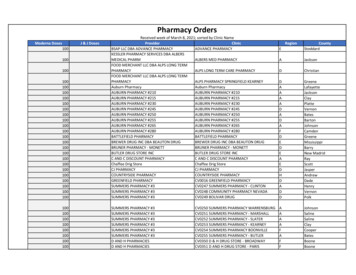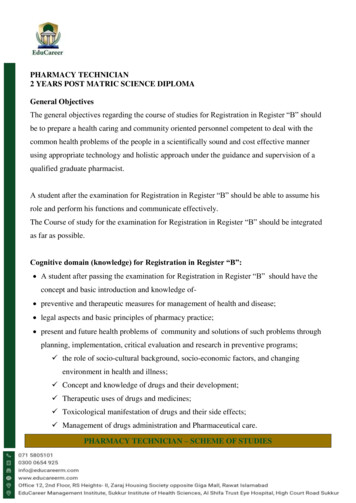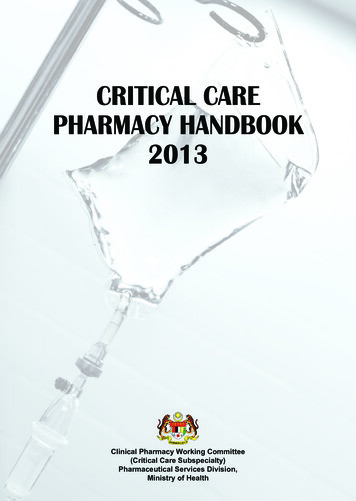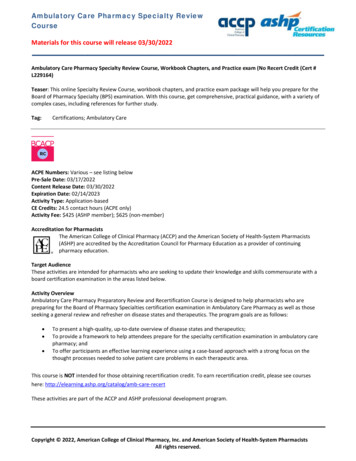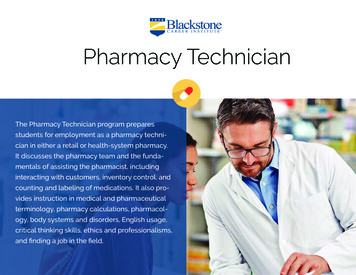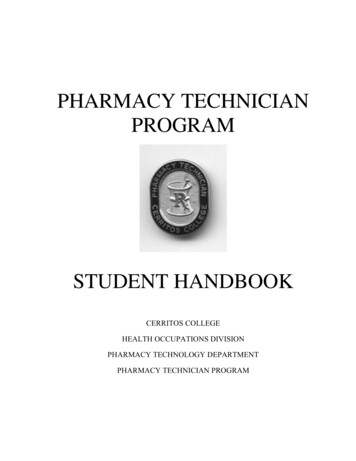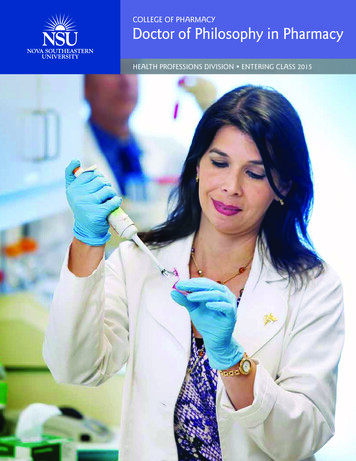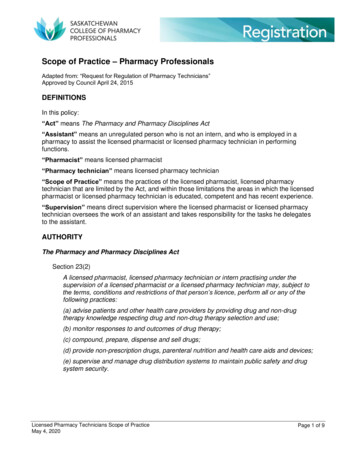
Transcription
Critical Care Pharmacy Review Course** Materials for this course will release 09/22/2021 **Critical Care Pharmacy Review Course, Pract Exam, and Core Therapeutic Modules Package (Cert # L219196)Teaser: This online Specialty Review Course, Practice Exam, and Core Therapeutic Modules package will help you preparefor the Board of Pharmacy Specialty (BPS) examination. With this course, get comprehensive, practical guidance, with avariety of complex cases, including references for further study.Tag:Certifications; Critical CareACPE Numbers: Various – see listing belowPre-Sale Date: 09/01/2021Content Release Date: 09/22/2021Expiration Date: 08/23/2022Activity Type: Application-basedCE Credits: 26.25 (BPS and ACPE) contact hoursActivity Fee: 425 (ASHP member); 625 (non-member)Accreditation for PharmacistsThe American Society of Health-System Pharmacists is accredited by the Accreditation Council for PharmacyEducation as a provider of continuing pharmacy education.Target AudienceThese activities are intended for pharmacists who are seeking to update their knowledge and skills commensurate with aboard certification examination in the areas listed below.Activity OverviewThis online course provides a robust preparatory curriculum for the pharmacy professional preparing for the Board ofPharmacy Specialties (BPS) Critical Care Pharmacy Specialty Certification Examination. Designed based on the domains,tasks, and knowledge statements developed by the BPS for the certification examination, this course will help you preparefor the exam by identifying areas needed for in‐depth review of pediatric pharmacy issues by: Reviewing pertinent clinical topics and practice skillsProviding exam practice questionsListing valuable references for further studyThis course is NOT intended for those obtaining recertification credit. To earn recertification credit, please see courseshere: tricPharmacy-Review-Course-FacultyThese activities are part of the ASHP professional development program.Copyright 2021, American Society of Health-System Pharmacists. All rights reserved.
Critical Care Pharmacy Review Course** Materials for this course will release 09/22/2021 **REVIEW COURSE:The review course for recertification consists of 11 activities (see table below). In each activity, faculty review clinical topicsand practice skills using a case-based approach. This package is intended for board certified pharmacists in need ofrecertification credit; the activities were designed based on the content outline developed by the Board of PharmacySpecialties (BPS).Learning ActivityACPE NumberContactHoursComplex Case: Complications after Cardiac Surgery Glucose, Sedation, and -H01-P1.509/22/2024Complex Case: Acute Coronary 0240204-0000-21-985-H04-P2.005/16/2024Practice Administration and Development Part 10204-0000-21-995-H04-P1.009/22/2024Practice Administration and Development Part 20204-0000-21-996-H04-P1.009/22/2024Complex Case: Antithrombotic-AssociatedIntracerebral HemorrhageComplex Case: SepsisComplex Case: Hyperglycemic Emergency andCommunity-Acquired PneumoniaComplex Case: PneumoniaComplex Case: Oncologic Emergencies: FebrileNeutropenia, Tumor Lysis Syndrome, andHypercalcemia of MalignancyComplex Case: GI Bleeding and Acute Renal FailureStatistics, Evidence-Based Medicine, and Clinical TrialDesignLearning ObjectivesAfter participating in this CPE activity, learners should be able to:Complex Case: Complications after Cardiac Surgery - Glucose, Sedation, and ThrombocytopeniaACPE #: 0204-0000-21-987-H01-P Develop treatment and monitoring plans for a complex post-cardiac surgery patient to include pain, agitation anddelirium, glucose management, and heparin-induced thrombocytopenia. Evaluate the impact of critical illness on pre-existing conditions (e.g., endocrine disorders, pain). Summarize quality assurance and process improvement methods relevant to critical care. Assess the relationship between institutional guideline development and evidence-based critical care literature.Complex Case: Acute Coronary SyndromeACPE #: 0204-0000-21-988-H01-P Develop treatment and monitoring plans for a complex critical care patient with acute coronary syndrome. Modify treatment and monitoring plans related to alterations of pharmacodynamics and pharmacokinetics in thecritically ill. Select devices required for treatment and monitoring of a critical care patient. Select fluid, electrolyte and acid/base management and monitoring based on patient-specific factors.Copyright 2021, American Society of Health-System Pharmacists. All rights reserved.
Critical Care Pharmacy Review Course** Materials for this course will release 09/22/2021 **Complex Case: Antithrombotic-Associated Intracerebral HemorrhageACPE #: 0204-0000-21-989-H01-P Develop treatment and monitoring plans for a complex critical care patient with antithrombotic-associatedintracerebral hemorrhage (ICH). Select appropriate neurologic monitoring techniques. Recommend agents for acute volume resuscitation and hemostasis (e.g., blood products, hemostatic agents). Evaluate the impact of critical illness on preexisting conditions (e.g., cardiovascular diseases). Recommend fluid and electrolyte management based on patient-specific factors.Complex Case: SepsisACPE #: 0204-0000-21-990-H01-P Develop treatment and monitoring plans for a complex critical care patient with an intra-abdominal infection,sepsis/SIRS, and shock. Select appropriate routes of administration for medications in critically ill patients. Modify treatment and monitoring plans related to alterations of pharmacodynamics and pharmacokinetics in thecritically ill. Recommend agents for acute volume resuscitation and hemostasis (e.g., crystalloids, colloids).Complex Case: Hyperglycemic Emergency and Community-Acquired PneumoniaACPE #: 0204-0000-21-991-H01-P Develop treatment and monitoring plans for a complex critical care patient with hyperglycemic emergency andcommunity-acquired pneumonia. Select appropriate routes and methods of administration for medications in critically ill patients. Select fluid, electrolyte and acid/base management and monitoring based on patient-specific factors. Choose agents for acute volume resuscitation. Identify medication safety issues patients requiring care in the ICU. Explain nutrition support in the critically ill patient.Complex Case: PneumoniaACPE #: 0204-0000-21-992-H01-P Develop treatment and monitoring plans for a complex critical care patient with multiple conditions, includingpneumonia and acute respiratory distress syndrome (ARDS). Identify drug interactions and adverse drug events common in critical care and methods to document.Complex Case: Oncologic Emergencies: Febrile Neutropenia, Tumor Lysis Syndrome, and Hypercalcemia of MalignancyACPE #: 0204-0000-21-993-H01-P Develop treatment and monitoring plans for a complex critical care patient with febrile neutropenia, tumor lysissyndrome, or hypercalcemia of malignancy. Select fluid, electrolyte and acid/base management and monitoring based on patient-specific factors. Evaluate the impact of critical illness on pre-existing conditions (e.g., cancer).Copyright 2021, American Society of Health-System Pharmacists. All rights reserved.
Critical Care Pharmacy Review Course** Materials for this course will release 09/22/2021 **Complex Case: GI Bleeding and Acute Renal FailureACPE #: 0204-0000-21-994-H01-P Develop treatment and monitoring plans for a complex critical care patient with gastrointestinal bleeding, alcoholwithdrawal, refeeding syndrome, hepatorenal syndrome, cirrhosis, and acute renal failure with renal replacementtherapy. Modify treatment and monitoring plans related to alterations of pharmacodynamics and pharmacokinetics in thecritically ill. Select appropriate routes of administration for medications in critically ill patients. Recommend agents for acute volume resuscitation and hemostasis (e.g., blood products, hemostatic agents).Statistics, Evidence-Based Medicine, and Clinical Trial DesignACPE #: 0204-0000-21-985-H04-P Determine quality and appropriateness of a study by examining study design, statistical analysis, sources of bias,quality of conclusions, and interpretation of graphs. Determine clinical and statistical significance of a study outcome. Determine whether the study applies to a specified patient population.Practice Administration and Development Part 1ACPE #: 0204-0000-21-995-H04-P Develop a plan to monitor and evaluate compliance with, and impact of, policies and guidelines (e.g., institutional,evidence based). Describe the application and integration of evidence-based critical care literature into institutional guidelines andprocesses. Evaluate regulatory/IRB requirements relative to conducting critical care research. Select quality assurance methods and improvement activities, including needs assessment techniques, aimed atenhancing the safety and effectiveness of medication-use processes in the critical care area.Practice Administration and Development Part 2ACPE #: 0204-0000-21-996-H04-P Identify metrics for evaluating the quality of critical care pharmacy services (e.g., lengths of ICU stay, mortality,cost-effectiveness, ROI). Examine the evidence-based literature that supports the value of critical care pharmacy. Summarize the factors that enhance the education and training of critical care pharmacists available in publisheddocuments from relevant professional societies (e.g., ASHP, ACCP, SCCM).Copyright 2021, American Society of Health-System Pharmacists. All rights reserved.
Critical Care Pharmacy Review Course** Materials for this course will release 09/22/2021 **CORE THERAPEUTIC MODULES:The Core Therapeutic Modules Review Package consists of 10 activities in which faculty review clinical topics and practiceskills using a case-based approach. The activities are designed to assist the learner in identifying knowledge gaps inpreparation for a pharmacy specialty board examination. In addition to a recorded presentation, each activity includes linksto resources for further self-study and a practice test developed in the same format and rigor as the specialty exam.Select Topics in Acid-Base ate09/20/22Select Topics in Infectious Diseases in Critical Care Patients0204-0000-19-600-H01-P1.0009/25/22Select Neurology Topics in Critical Care 0009/22/23Select Topics in Toxicology0204-0000-21-612-H01-P1.0009/20/22Select Topics in Pulmonary Disorders0204-0000-19-601-H01-P1.0009/25/22Cardiac Arrhythmias and Advanced Cardiac Life herapy Considerations in the Management of Shock0204-0000-20-993-H01-P1.0009/22/23Fluid, Electrolytes, and g ActivityACPE NumberAlterations in Pharmacokinetics and Pharmacodynamics inCritical CareSelect Topics in Prevention and Supportive Care in Critical CarePatientsContactHoursLearning ObjectivesAfter participating in these CPE activities, learners should be able to:Select Topics in Acid-Base DisordersACPE #: 0204-0000-21-610-H01-PFor the following specific acid/base disorders - respiratory, metabolic acid base disorders including anion gap/non-aniongap acidosis, renal tubular acidosis, as well as delta gap equation: Interpret laboratory and diagnostic tests. Recommend the most appropriate treatment and monitoring plans based on patient-specific information andcurrent guidelinesSelect Topics in Infectious Diseases in Critical Care PatientsACPE #: 0204-0000-19-600-H01-PAt the conclusion of this application-based educational activity, participants should be able to do the following: For the following specific infectious disease topics: urinary tract infections, meningitis, tuberculosis and catheterrelated infections:o Interpret laboratory and diagnostic tests.o Formulate the most appropriate treatment and monitoring plans based on patient-specific informationand current guidelines.o Interpret available information to manage drug-related problems, evaluate response to therapy, andmodify patient-specific treatment plans based on follow-up assessment.Copyright 2021, American Society of Health-System Pharmacists. All rights reserved.
Critical Care Pharmacy Review Course** Materials for this course will release 09/22/2021 **Select Neurology Topics in Critical Care PatientsACPE #: 0204-0000-20-990-H01-P For the following specific critical care topics: status epilepticus, traumatic brain injury, ischemic stroke, subarachnoidhemorrhage:o Interpret laboratory and diagnostic tests.o Evaluate benefits and risks of drug therapy considering other medication, and other patient-specificfactors.o Recommend the most appropriate treatment and monitoring plans based on patient-specific informationand current guidelines.Alterations in Pharmacokinetics and Pharmacodynamics in Critical CareACPE #: 0204-0000-21-611-H01-P Identify pharmacokinetic and pharmacodynamic (PK/PD) changes that occur in critical illness, and the impact oncommonly administered medications in this setting. Apply knowledge of general PK/PD changes in critical illness to the following patient-specific factors that furthercomplicate drug dosing:o Burnso Obesityo Pregnancyo Continuous renal replacement therapy (CRRT)o Extracorporeal membrane oxygenation (ECMO) Develop a therapeutic strategy to optimize PK/PK for commonly used medications in the intensive care unit. "Select Topics in Prevention and Supportive Care in Critical Care PatientsACPE #: 0204-0000-20-991-H01-PFor the following specific critical care topics stress ulcer prophylaxis (SUP), venous thromboembolism (VTE) prophylaxis,bowel regimens, and ventilator associated pneumonia (VAP) prevention: Interpret laboratory and diagnostic tests. Recommend the most appropriate treatment and monitoring plans based on patient-specific information andcurrent guidelines.Select Topics in ToxicologyACPE #: 0204-0000-21-612-H01-PFor the following specific toxicology topics: acetaminophen, toxic alcohols, calcium channel blockers, beta blockers, opioids,and ecstasy: Interpret laboratory and diagnostic tests Recommend the most appropriate treatment and monitoring plans based on patient-specific information andcurrent guidelinesSelect Topics in Pulmonary DisordersACPE #: 0204-0000-19-601-H01-P For the following specific pulmonary topics: asthma exacerbation, acute exacerbation of chronic obstructivepulmonary disease (COPD), and pulmonary embolism:o Interpret laboratory and diagnostic tests.o Formulate the most appropriate treatment and monitoring plans based on patient-specific informationand current guidelines.o Interpret available information to manage drug-related problems, evaluate response to therapy, andmodify patient-specific treatment plans based on follow-up assessment.Copyright 2021, American Society of Health-System Pharmacists. All rights reserved.
Critical Care Pharmacy Review Course** Materials for this course will release 09/22/2021 **Cardiac Arrhythmias and Advanced Cardiac Life SupportACPE #: 0204-0000-20-992-H01-P Interpret signs, symptoms and diagnostic tests for cardiac arrhythmias. Identify drug-related problems, including drug interactions and adverse effects, associated with pharmacotherapyof cardiac arrhythmias. Identify strategies to prevent drug-induced arrhythmias. Recommend therapy and monitoring for cardiac arrhythmias based on patient-specific information, currentguidelines and Advanced Cardiac Life Support guided therapies.Pharmacotherapy Considerations in the Management of ShockACPE #: 0204-0000-20-993-H01-P Interpret diagnostic and/or laboratory tests, vital signs, and clinical presentation in order to differentiate types ofshock (hypovolemic, distributive, cardiogenic) Compare and contrast the pharmacologic agents utilized in shock Recommend therapy and monitoring based on patient-specific information and current guidelines for thetreatment of shockFluid, Electrolytes, and NutritionACPE #: 0204-0000-19-602-H01-PAt the conclusion of this application-based educational activity, participants should be able to do the following: Interpret laboratory and diagnostic tests to evaluate fluid, electrolyte and nutrition status. Select the appropriate route for nutrition administration, and evaluate if nutrition needs are being met based onpatient-specific information and current guidelines. Manage drug-related electrolyte interactions and nutrient interactions. Determine the most appropriate therapy and monitoring in patients with fluid, electrolyte, and nutritionaldisorders based on patient-specific information and current guidelines.REVIEW COURSE:Faculty CriticalCare-Pharmacy-Review-Course-Faculty)Angela Bingham, Pharm.D., BCPS, BCNSP, BCCCP, FASPEN, FCCP*Interim Vice Chair and Associate Professor of Clinical Pharmacy, PGY2 Critical Care Pharmacy Residency Program Director,Residency Programs CoordinatorPhiladelphia College of Pharmacy, University of the SciencesPhiladelphia, PennsylvaniaCritical Care Clinical Pharmacy SpecialistCooper University HospitalCamden, New JerseyBrian Dee, Pharm.D., BCCCP, BCNSP, FCCMClinical Pharmacy Specialist - Critical Care/Nutrition SupportThe University of Texas MD Anderson Cancer CenterHouston, TexasCopyright 2021, American Society of Health-System Pharmacists. All rights reserved.
Critical Care Pharmacy Review Course** Materials for this course will release 09/22/2021 **Mary M. Hess, Pharm.D., FASHP, FCCM, FCCP, BCCCP*Associate DeanProfessor, Pharmacy PracticeJefferson College of PharmacyPhiladelphia, PennsylvaniaG. Morgan Jones, Pharm.D., BCCCP, FCCMClinical Pharmacy Specialist – Neurocritical CareMethodist University HospitalAssistant Professor of Neurology, Neurosurgery, and Clinical Pharmacy and Translational SciencesUniversity of Tennessee Health Sciences CenterMemphis, TennesseePatricia Kienle, M.P.A., BCSCP, FASHPDirector, Accreditation and Medication SafetyCardinal HealthWilkes-Barre, PennsylvaniaJohn Marshall, Pharm.D., BCPS, BCCCP, FCCMDirector, Clinical Pharmacy ProgramsMassachusetts General HospitalBoston, MassachusettsKrystal Moorman, Pharm.D., BCPSDirector Experiential Education and Assistant Clinical ProfessorUniversity of Utah College of PharmacySalt Lake City, UtahJill Starykowicz, Pharm.D., BCCCPClinical Pharmacy Specialist, Cardiology/Medical Intensive CareAdvocate Lutheran General HospitalPark Ridge, IllinoisRachel Swope, Pharm.D., BCCCPClinical Pharmacy ManagerNorton HealthcareLouisville, KentuckyPaul Szumita, Pharm.D., BCCCP, BCPS, FASHP, FCCM*Director of Clinical PharmacyBrigham & Women's HospitalBoston, MassachusettsHeather Torbic, Pharm.D., BCPS, BCCCPMedical ICU Clinical Pharmacy SpecialistCleveland ClinicCleveland, Ohio*Content Matter ExpertsCopyright 2021, American Society of Health-System Pharmacists. All rights reserved.
Critical Care Pharmacy Review Course** Materials for this course will release 09/22/2021 **ReviewersHolly L. Byrnes, Pharm D., BCPSSusan R. Dombrowski, M.S., R.Ph.Jill A. Sellers, B.S.Pharm., Pharm.D.CORE THERAPEUTIC MODULES:Faculty CriticalCare-Pharmacy-Review-Course-Faculty)Kevin E. Anger, Pharm.D., BCPSPharmacy SupervisorBrigham and Women's HospitalBoston, MassachusettsMojdeh HeavnerAssociate Professor and Vice Chair for Clinical ServicesUniversity of Maryland School of PharmacyBaltimore, MarylandDaniel R. Malcom, Pharm.D., BCPS, BCCCPAssociate Professor and Chair, Department of Pharmacy PracticeSullivan University College of Pharmacy and Health SciencesLouisville, KentuckyContent Matter ExpertsAngela Bingham, Pharm.D., BCPS, BCNSP, BCCCP, FASPEN, FCCPInterim Vice Chair and Associate Professor of Clinical Pharmacy, PGY2 Critical Care Pharmacy Residency Program Director,Residency Programs CoordinatorPhiladelphia College of Pharmacy, University of the SciencesPhiladelphia, PennsylvaniaCritical Care Clinical Pharmacy SpecialistCooper University HospitalCamden, New JerseyMary M. Hess, Pharm.D., FASHP, FCCM, FCCP, BCCCPAssociate DeanProfessor, Pharmacy PracticeJefferson College of PharmacyPhiladelphia, PennsylvaniaPaul Szumita, Pharm.D., BCCCP, BCPS, FASHP, FCCMDirector of Clinical PharmacyBrigham & Women's HospitalBoston, MassachusettsReviewersHolly L. Byrnes, Pharm D., BCPSSusan R. Dombrowski, M.S., R.Ph.Jill A. Sellers, B.S.Pharm., Pharm.D.Copyright 2021, American Society of Health-System Pharmacists. All rights reserved.
Critical Care Pharmacy Review Course** Materials for this course will release 09/22/2021 **DisclosuresIn accordance with the Accreditation Council for Continuing Medical Education’s Standards for Commercial Support and theAccreditation Council for Pharmacy Education’s Standards for Commercial Support, ASHP requires that all individualsinvolved in the development of activity content disclose their relevant financial relationships. A person has a relevantfinancial relationship if the individual of his or her spouse/partner has a financial relationship (e.g. employee, consultant,research grant recipient, speakers bureau, or stockholder) in any amount occurring the in the last 12 months with acommercial interest whose products or series may be discussed in the educational activity content over which theindividual has control. The existence of these relationships is provided for the information of participants and should not beassumed to have an adverse impact on the content.All faculty and planners for ASHP education activities are qualified and selected by ASHP and required to disclose anyrelevant financial relationships with commercial interests. ASHP identifies and resolves conflicts of interest prior to anindividual’s participation in development of content for an educational activity. Anyone who refuses to disclose relevantfinancial relationships must be disqualified from any involvement with a continuing pharmacy education activity. Brian Dee: Spouse employed by PfizerPatricia Kienle: Cardinal Health (employee), CriticalPoint LLC (instructor), USP (volunteer, ASHP author)All other planners, presenters, reviewers, ASHP and others with an opportunity to control content report no financialrelationships relevant to this activity.Methods and CE RequirementsActivities can be completed in any order. Each activity consists of audio, video, and/or PDFs and evaluations. Learners mustreview all content and complete the evaluations to receive continuing pharmacy education credit for each activity.Follow the prompts to claim, view, or print the statement of credit within 60 days after completing the activity.System Technical RequirementsLearning activities are delivered via your Web browser and Acrobat PDF. For all activities you should have a basic comfortlevel using a computer and navigating web sites.View the minimum technical and system requirements for learning activities.DevelopmentThese activities were developed by ASHP.To maintain its strict, independent standards for certification, BPS does NOT endorse or provide review information,preparatory courses, or study guides for Board Certification Examinations.Copyright 2021, American Society of Health-System Pharmacists. All rights reserved.
Critical Care Pharmacy Review Course, Pract Exam, and Core Therapeutic Modules Package (Cert # L219196) Teaser: This online Specialty Review Course, Practice Exam, and Core Therapeutic Modules package will help you prepare for the Board of Pharmacy Specialty (BPS) examination. With this course, get comprehensive, practical guidance, with a
